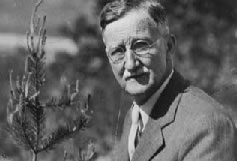Indiana's First State Forester, Charles Deam '89, is Recalled
August 30, 2016
 "Charles C. Deam was born on Aug. 30, 1865. If you enjoy the forests of Indiana, you should be thankful to Charles Deam," states a Muncie Star Press article on the member of DePauw University's Class of 1889.
"Charles C. Deam was born on Aug. 30, 1865. If you enjoy the forests of Indiana, you should be thankful to Charles Deam," states a Muncie Star Press article on the member of DePauw University's Class of 1889.
Julie Borgmann asks, "So who is Charles C. Deam and why should we be thankful? Deam, a self-taught scientist, became one of the foremost botanists in the country and the father of forestry in Indiana. This is an interesting story, the story of a man with a relentless work ethic and scientific curiosity. A man who recognized a problem and sounded the alarm about the destruction of Indiana’s environment in the early 20th century."
Named Indiana's first state forester in 1909, "During his lifetime (Deam) traveled all 1,016 townships in Indiana collecting over 78,000 plant specimens. He devoted himself to documenting all the vascular plants in Indiana and wrote 4 books ... Deam’s lasting legacy came from his observations on Indiana’s environment as he traveled the state to collect specimens. The early 1900’s were a time of great change in Indiana. Progress brought the axe, plow, fire, drainage, railroads and highways to the Indiana landscape."
According to Borgmann, "Deam saw firsthand and then spoke out about the important biological changes that take place when forest is replaced with agricultural production. He raised concern about soil erosion in southern Indiana, grazing of forestland, and the effect of migrating non-native plants in the ecosystem.His conservation philosophy  was to leave the land in as nearly a natural condition as possible, consistent with a sensible and frugal use of its resources. Deam’s idea of encouraging a sustainable use of the land was quite novel 100 years ago. His work saved our forests from extinction, and his philosophy is even more critical today."
was to leave the land in as nearly a natural condition as possible, consistent with a sensible and frugal use of its resources. Deam’s idea of encouraging a sustainable use of the land was quite novel 100 years ago. His work saved our forests from extinction, and his philosophy is even more critical today."
You'll find the complete article here.
Charles Deam attended DePauw between 1885 and 1887. Forced to drop out due to a lack of funds, Deam went on to work at odd jobs, including that of drug store apprentice. He began collecting plants sometime in the 1890s. Although he never earned a degree in botany, he did receive honorary degrees from DePauw, Indiana University and Wabash College. He died in 1953.
Source: Muncie (Ind.) Star Press
Back